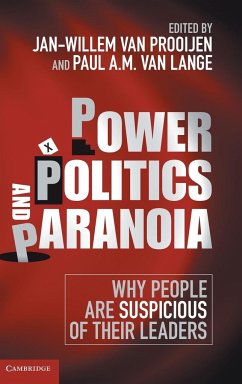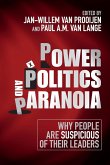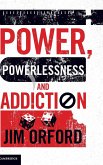Power, Politics, and Paranoia
Why People Are Suspicious of Their Leaders
Herausgeber: Prooijen, Jan-Willem Van; Lange, Paul A. M. Van
Power, Politics, and Paranoia
Why People Are Suspicious of Their Leaders
Herausgeber: Prooijen, Jan-Willem Van; Lange, Paul A. M. Van
- Gebundenes Buch
- Merkliste
- Auf die Merkliste
- Bewerten Bewerten
- Teilen
- Produkt teilen
- Produkterinnerung
- Produkterinnerung
Why are people frequently suspicious of their political and corporate leaders? This book examines the psychological roots of political paranoia.
Andere Kunden interessierten sich auch für
![Power, Politics, and Paranoia Power, Politics, and Paranoia]() Power, Politics, and Paranoia39,99 €
Power, Politics, and Paranoia39,99 €![Crowds, Psychology, and Politics, 1871 1899 Crowds, Psychology, and Politics, 1871 1899]() Jaap Van GinnekenCrowds, Psychology, and Politics, 1871 189963,99 €
Jaap Van GinnekenCrowds, Psychology, and Politics, 1871 189963,99 €![Power, Powerlessness and Addiction Power, Powerlessness and Addiction]() Jim OrfordPower, Powerlessness and Addiction67,99 €
Jim OrfordPower, Powerlessness and Addiction67,99 €![Manic-Depressive Insanity and Paranoia Manic-Depressive Insanity and Paranoia]() Emil KraepelinManic-Depressive Insanity and Paranoia37,99 €
Emil KraepelinManic-Depressive Insanity and Paranoia37,99 €![Schema Therapy Adapted for Psychosis and Bipolarity Schema Therapy Adapted for Psychosis and Bipolarity]() John RhodesSchema Therapy Adapted for Psychosis and Bipolarity170,99 €
John RhodesSchema Therapy Adapted for Psychosis and Bipolarity170,99 €![Studies In Paranoia Studies In Paranoia]() Nikolaus GierlichStudies In Paranoia20,99 €
Nikolaus GierlichStudies In Paranoia20,99 €![Fear/Less Fear/Less]() Fear/Less26,99 €
Fear/Less26,99 €-
-
-
Why are people frequently suspicious of their political and corporate leaders? This book examines the psychological roots of political paranoia.
Produktdetails
- Produktdetails
- Verlag: Cambridge University Press
- Seitenzahl: 340
- Erscheinungstermin: 23. April 2014
- Englisch
- Abmessung: 235mm x 157mm x 23mm
- Gewicht: 644g
- ISBN-13: 9781107035805
- ISBN-10: 1107035805
- Artikelnr.: 40902849
- Herstellerkennzeichnung
- Libri GmbH
- Europaallee 1
- 36244 Bad Hersfeld
- gpsr@libri.de
- Verlag: Cambridge University Press
- Seitenzahl: 340
- Erscheinungstermin: 23. April 2014
- Englisch
- Abmessung: 235mm x 157mm x 23mm
- Gewicht: 644g
- ISBN-13: 9781107035805
- ISBN-10: 1107035805
- Artikelnr.: 40902849
- Herstellerkennzeichnung
- Libri GmbH
- Europaallee 1
- 36244 Bad Hersfeld
- gpsr@libri.de
1. Power, politics, and paranoia: an introduction Jan-Willem van Prooijen
and Paul A. M. van Lange; Part I. Power: 2. The effects of power on
immorality Joris Lammers and Ilja van Beest; 3. Do we give power to the
right people? When and how norm violators rise to the top Eftychia Stamkou
and Gerben van Kleef; 4. The leaders' rosy halo: why do we give
powerholders the benefit of the doubt? Pamela K. Smith and Jennifer R.
Overbeck; 5. 'Power corrupts' revisited: the role of construal of power as
opportunity or responsibility Kai Sassenberg, Naomi Ellemers, Daan
Scheepers and Annika Scholl; Part II. Politics: 6. Never trust a
politician? Collective distrust, relational accountability, and voter
response Susan T. Fiske and Federica Durante; 7. Political distrust: the
seed and fruit of popular empowerment Fouad Bou Zeineddine and Felicia
Pratto; 8. All power to our great leader: political leadership under
uncertainty John J. Haller and Michael A. Hogg; 9. Those who supported and
voted for Berlusconi. A social-psychological profile of the willing
followers of a controversial political leader Antonio Chirumbolo and Luigi
Leone; 10. A growing confidence gap in politics? Data versus discourse Rudy
B. Andeweg; Part III. Paranoia: 11. Misconnecting the dots: origins and
dynamics of outgroup paranoia Roderick M. Kramer and Jennifer Schaffer; 12.
Political paranoia and conspiracy theories Viren Swami and Adrian Furnham;
13. The social dimension of belief in conspiracy theories Jan-Willem van
Prooijen and Paul A. M. van Lange; 14. Examining the monological nature of
conspiracy theories Robbie M. Sutton and Karen M. Douglas; 15. The role of
paranoia in a dual-process motivational model of conspiracy belief Marc
Wilson and Chelsea Rose; 16. Searching for the root of all evil: an
existential-sociological perspective on political enemyship and
scapegoating Daniel Sullivan, Mark J. Landau, Zachary K. Rothschild and
Lucas A. Keefer.
and Paul A. M. van Lange; Part I. Power: 2. The effects of power on
immorality Joris Lammers and Ilja van Beest; 3. Do we give power to the
right people? When and how norm violators rise to the top Eftychia Stamkou
and Gerben van Kleef; 4. The leaders' rosy halo: why do we give
powerholders the benefit of the doubt? Pamela K. Smith and Jennifer R.
Overbeck; 5. 'Power corrupts' revisited: the role of construal of power as
opportunity or responsibility Kai Sassenberg, Naomi Ellemers, Daan
Scheepers and Annika Scholl; Part II. Politics: 6. Never trust a
politician? Collective distrust, relational accountability, and voter
response Susan T. Fiske and Federica Durante; 7. Political distrust: the
seed and fruit of popular empowerment Fouad Bou Zeineddine and Felicia
Pratto; 8. All power to our great leader: political leadership under
uncertainty John J. Haller and Michael A. Hogg; 9. Those who supported and
voted for Berlusconi. A social-psychological profile of the willing
followers of a controversial political leader Antonio Chirumbolo and Luigi
Leone; 10. A growing confidence gap in politics? Data versus discourse Rudy
B. Andeweg; Part III. Paranoia: 11. Misconnecting the dots: origins and
dynamics of outgroup paranoia Roderick M. Kramer and Jennifer Schaffer; 12.
Political paranoia and conspiracy theories Viren Swami and Adrian Furnham;
13. The social dimension of belief in conspiracy theories Jan-Willem van
Prooijen and Paul A. M. van Lange; 14. Examining the monological nature of
conspiracy theories Robbie M. Sutton and Karen M. Douglas; 15. The role of
paranoia in a dual-process motivational model of conspiracy belief Marc
Wilson and Chelsea Rose; 16. Searching for the root of all evil: an
existential-sociological perspective on political enemyship and
scapegoating Daniel Sullivan, Mark J. Landau, Zachary K. Rothschild and
Lucas A. Keefer.
1. Power, politics, and paranoia: an introduction Jan-Willem van Prooijen
and Paul A. M. van Lange; Part I. Power: 2. The effects of power on
immorality Joris Lammers and Ilja van Beest; 3. Do we give power to the
right people? When and how norm violators rise to the top Eftychia Stamkou
and Gerben van Kleef; 4. The leaders' rosy halo: why do we give
powerholders the benefit of the doubt? Pamela K. Smith and Jennifer R.
Overbeck; 5. 'Power corrupts' revisited: the role of construal of power as
opportunity or responsibility Kai Sassenberg, Naomi Ellemers, Daan
Scheepers and Annika Scholl; Part II. Politics: 6. Never trust a
politician? Collective distrust, relational accountability, and voter
response Susan T. Fiske and Federica Durante; 7. Political distrust: the
seed and fruit of popular empowerment Fouad Bou Zeineddine and Felicia
Pratto; 8. All power to our great leader: political leadership under
uncertainty John J. Haller and Michael A. Hogg; 9. Those who supported and
voted for Berlusconi. A social-psychological profile of the willing
followers of a controversial political leader Antonio Chirumbolo and Luigi
Leone; 10. A growing confidence gap in politics? Data versus discourse Rudy
B. Andeweg; Part III. Paranoia: 11. Misconnecting the dots: origins and
dynamics of outgroup paranoia Roderick M. Kramer and Jennifer Schaffer; 12.
Political paranoia and conspiracy theories Viren Swami and Adrian Furnham;
13. The social dimension of belief in conspiracy theories Jan-Willem van
Prooijen and Paul A. M. van Lange; 14. Examining the monological nature of
conspiracy theories Robbie M. Sutton and Karen M. Douglas; 15. The role of
paranoia in a dual-process motivational model of conspiracy belief Marc
Wilson and Chelsea Rose; 16. Searching for the root of all evil: an
existential-sociological perspective on political enemyship and
scapegoating Daniel Sullivan, Mark J. Landau, Zachary K. Rothschild and
Lucas A. Keefer.
and Paul A. M. van Lange; Part I. Power: 2. The effects of power on
immorality Joris Lammers and Ilja van Beest; 3. Do we give power to the
right people? When and how norm violators rise to the top Eftychia Stamkou
and Gerben van Kleef; 4. The leaders' rosy halo: why do we give
powerholders the benefit of the doubt? Pamela K. Smith and Jennifer R.
Overbeck; 5. 'Power corrupts' revisited: the role of construal of power as
opportunity or responsibility Kai Sassenberg, Naomi Ellemers, Daan
Scheepers and Annika Scholl; Part II. Politics: 6. Never trust a
politician? Collective distrust, relational accountability, and voter
response Susan T. Fiske and Federica Durante; 7. Political distrust: the
seed and fruit of popular empowerment Fouad Bou Zeineddine and Felicia
Pratto; 8. All power to our great leader: political leadership under
uncertainty John J. Haller and Michael A. Hogg; 9. Those who supported and
voted for Berlusconi. A social-psychological profile of the willing
followers of a controversial political leader Antonio Chirumbolo and Luigi
Leone; 10. A growing confidence gap in politics? Data versus discourse Rudy
B. Andeweg; Part III. Paranoia: 11. Misconnecting the dots: origins and
dynamics of outgroup paranoia Roderick M. Kramer and Jennifer Schaffer; 12.
Political paranoia and conspiracy theories Viren Swami and Adrian Furnham;
13. The social dimension of belief in conspiracy theories Jan-Willem van
Prooijen and Paul A. M. van Lange; 14. Examining the monological nature of
conspiracy theories Robbie M. Sutton and Karen M. Douglas; 15. The role of
paranoia in a dual-process motivational model of conspiracy belief Marc
Wilson and Chelsea Rose; 16. Searching for the root of all evil: an
existential-sociological perspective on political enemyship and
scapegoating Daniel Sullivan, Mark J. Landau, Zachary K. Rothschild and
Lucas A. Keefer.









